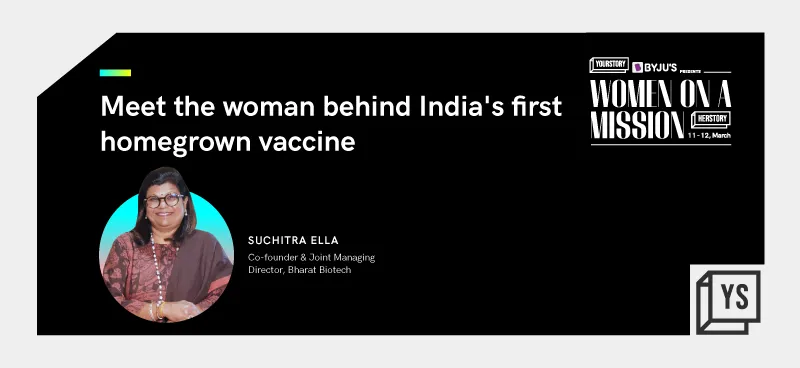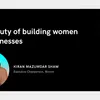You wear multiple hats when you are a small startup entrepreneur. We went three years without an income: Suchitra Ella
At HerStory’s Women on a Mission Summit, Suchitra Ella, Co-founder and Joint MD of Bharat Biotech, recounted the challenges of developing India’s first homegrown vaccine, COVAXIN, and also shared insights on her life in the US and returning to India to become a first-generation entrepreneur.
They say childhood experiences have a huge role to play in shaping one’s adult life. For Suchitra Ella, the woman behind India’s first indigenous vaccine for Covid-19, it was her “holistic upbringing” that helped her imbibe a sense of independence and fearlessness to help her tide through some of the most challenging times in her life.
The idea of moving to a new country could be both exciting and dreadful. The latter amplifies when you are the sole breadwinner, a mother of two children with a basic degree in education.
In 1986, Suchitra and her husband, Dr Krishna Ella, had decided to move to the US for higher learning and research. Krishna had enrolled in the University of Hawaii for an MS and subsequently pursued his PhD from the University of Wisconsin-Madison, which went on for about seven years, leaving a financial strain on the young family. Suchitra, though, had braced herself for the challenge.
“Our US stint of about 13-14 years reinforced my early childhood experiences of being independent in terms of looking at life. We were a young family and Krishna was enrolled in graduate school. It was a seven-year long stint as a PhD student, bringing home a very frugal research assistantship income. I became the breadwinner, if I may say so, because I had to. I jumped in and said this is the best time for me to do this. Maybe not after he (Krishna) gets a nice plush job, but right now, this is the moment, do it,” said Suchitra in a fireside chat at HerStory’s Women on a Mission Summit.
The young woman "with an Indian accent" and a “primary educational background”, managed to get front-end and marketing job positions in the retail sector. She built upon her inherent strength, absorbed everything around her and ensured she was skilling herself all the time.
“I had a two-year-old daughter and I had to be prepared to handle her and also go to work full time, be supportive in terms of ensuring that we had a quality of life, not just monetarily, but overall as well. Krishna and I would pitch in equally, including all the household chores,” she added.
Suchitra had her second child after moving to Madison in Wisconsin, and went through the whole grind again. “I was working till the last 48 hours prior to when I delivered my child,” said Suchitra, who did not let anything come in the way of taking charge and supporting the family.

Starting up in the 90s
In 1995-96, Suchitra proposed the idea of returning to India to pursue the dream of entrepreneurship to her husband Krishna, who had taken a faculty position at the Medical University of South Carolina-Charleston.
It was at a time when India was witnessing a frenzy among youth to immigrate to the US for greener pastures. So much so, that coming back to India at that point was almost inconceivable. The couple challenged the narrative and left their cushy jobs in the US to become first-generation entrepreneurs.
What drove them was a vision to develop innovative remedies for developing world healthcare challenges. The idea was to establish scientific prowess, manufacturing capabilities, and search capabilities in terms of applicational science.
“As a young startup in the late 90s, our passion and vision with which we built this organisation was not to make healthcare solutions for the Western world. There was an enormous burden on the healthcare system in terms of the cost and vaccines in the West didn’t come cheap either. The country needed cost-effective solutions, good and safe technology, and quality solutions. All said and done, we are still a developing country and have issues in terms of public health,” said Suchitra.
As every other startup, had its share of challenges, with limited manpower, tight budgets and pressure around research. While Krishna was the brain behind the organisation, Suchitra worked behind the scenes, taking care of marketing, administration, customer services, business development and even paying bills and receiving front end calls, to build the company ground up.
“You wear multiple hats when you are a small startup entrepreneur. We went three years without income. I used to answer telephone calls in my office as no one wanted to join a company which makes no money. I performed almost every function, you name it,” she says.
Taking pride
Bharat Biotech, today, produces close to about 80 million doses per month across its three plants in Bengaluru, Hyderabad and Gujarat, serving a population of over a billion.
Suchitra takes immense pride in being a part of the country’s COVID- 19 vaccination mission.
“I'm very happy to say that both Indian organisations have serviced the country's requirements. The campaign is coming to a close and hopefully in a month or so, we will reach that 2one billion population getting the second dose as well. This is a mind-boggling number and we have achieved it. This is in itself a great story that is going across the world in terms of how India has managed its vaccination drive against the COVID-19,” she said .
Suchitra gives full credit to her team for helping the pharma giant achieve this feat.
“From collecting samples from Pune to bringing them to Hyderabad, to making the formulations and getting the first dose out, the credit goes to the team members who took it upon themselves, and risked their own safety.
They worked round the clock and did not go home for at least three months. They chose to stay close to our campus and sacrificed their time with the families back home,” she shared.
As Co-founder and Joint Managing Director of Bharat Biotech, Suchitra’s vision, hard work, leadership and organisational capabilities have helped in fostering a sustainable growth path for the company.
“We were first-generation entrepreneurs. I did not come to this table with a full plate. We started out with an empty plate. And every little morsel that came on the plate had to be earned, had to be worked hard, and struggled. We did not inherit any business legacy as my father was a mining engineer,” she explained.
Suchitra advised women leaders to prioritise, manage time and focus on what is important.
“You can’t achieve everything at all times so make a conscious choice between short, mid and longterm goals,” she said.
A shout out to the sponsors of Women on Mission Summit 2022, an Initiative by HerStory, by YourStory -BYJU'S, the presenting partner, and other sponsors - Kyndryl, Sequoia Spark, Zilingo, Atlassian, Akamai, Freshworks for Startups, and Netapp Excellerator.
Edited by Rekha Balakrishnan









